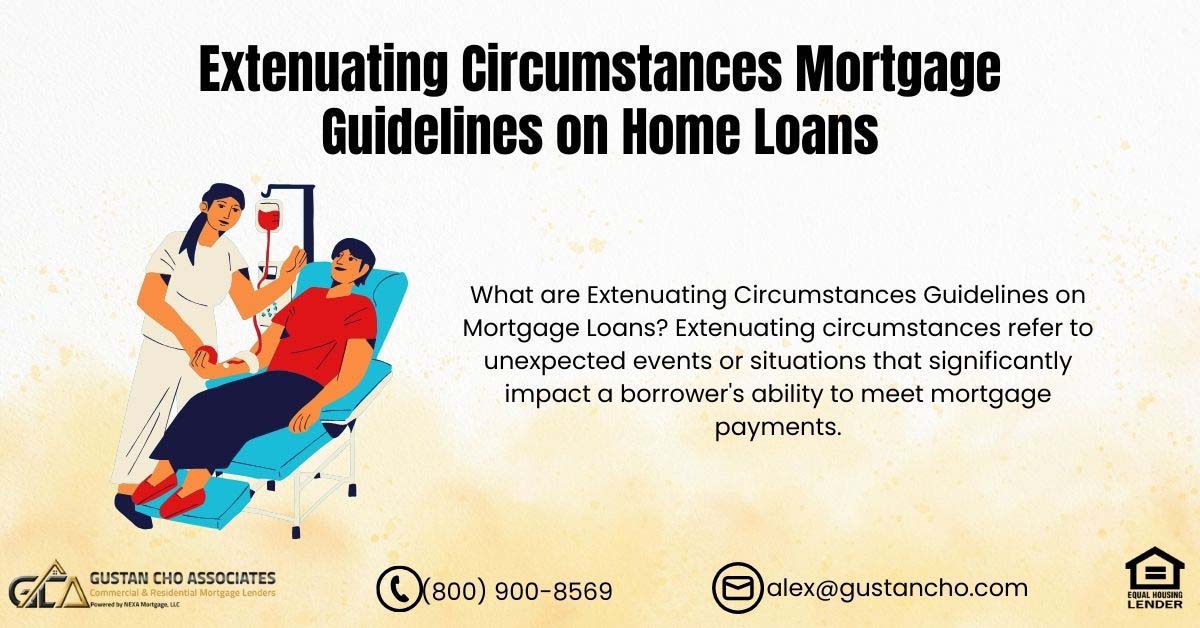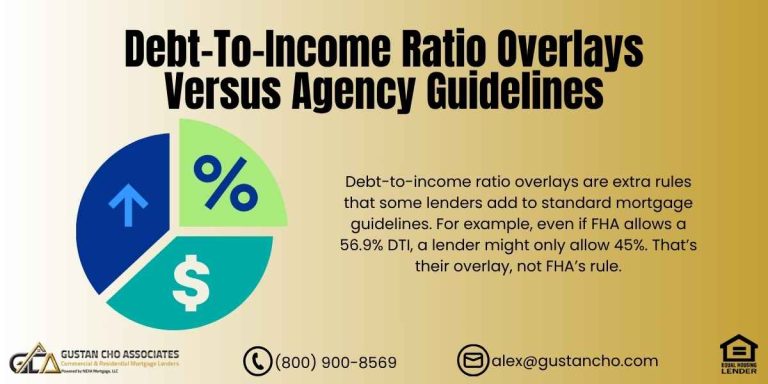This guide outlines the Extenuating Circumstances Guidelines for home loans, which are crucial for borrowers seeking FHA, VA, USDA, or conventional loans. While these loans typically require adherence to specific agency mortgage guidelines, there are provisions for borrowers facing extenuating circumstances. For example, although the VA mandates a two-year waiting period after Chapter bankruptcy, this period can be reduced to one year if the borrower can demonstrate extenuating circumstances:
Securing exemption from adhering to agency mortgage guidelines based on extenuating circumstances is challenging. Borrowers seldom succeed in bypassing these guidelines under such circumstances.
After filing for Chapter 7 bankruptcy, an individual must usually wait two years to meet the eligibility criteria for an FHA loan. As per the extenuating circumstances guidelines established by the HUD Agency, qualifying for an FHA loan within a year after the discharge date is possible, provided that certain extenuating circumstances were present. The same leniency applies to VA loans.
This article aims to delve into extenuating circumstances guidelines about home loans, offering insights into what constitutes such circumstances and providing illustrative examples. By understanding these guidelines, borrowers can navigate their financial recovery journey more effectively and expedite their eligibility for home loans after experiencing challenging circumstances.
What Are Examples of Extenuating Circumstances
The Mortgage Agency’s Extenuating Circumstances Guidelines precisely describe what qualifies as such. Extenuating circumstances refer to situations outside an individual’s control. It’s important to note that events like divorce, career shifts, or relocation prompted by climate conditions do not fall within the purview of extenuating circumstances according to these guidelines.
The Extenuating Circumstances Guidelines apply universally across loan programs, including FHA, VA, USDA, Fannie Mae, and Freddie Mac. As described by all agency guidelines, these guidelines pertain to isolated events.
The Extenuating Circumstances Guidelines serve as a framework for understanding situations beyond an individual’s control, often resulting in a sudden and severe impact on their financial stability. These circumstances can range from unexpected medical emergencies to natural disasters, disrupting a person’s ability to generate income.
When faced with such challenges, individuals may grapple with mounting debt obligations while simultaneously experiencing a significant reduction or complete absence of income.
Due to these extenuating circumstances, individuals may struggle to meet their financial commitments, leading to delayed payments and, in some cases, derogatory credit reports. Despite their best efforts, a stable income stream exacerbates their financial hardships, making it difficult to stay afloat amidst mounting debt.
The Extenuating Circumstances Guidelines aim to provide support and understanding for individuals navigating these challenging situations, offering pathways to address their financial difficulties and rebuild their financial stability over time.
Denied Before? Let Us Review Your Unique Situation
Fannie Mae, FHA, and VA all allow exceptions for major life events. We’ll help you build your case.
What Are Extenuating Circumstances Guidelines on Mortgage Loans
This guide outlines the Extenuating Circumstances Guidelines for home loans, which are crucial for borrowers seeking FHA, VA, USDA, or conventional loans. While these loans typically require adherence to specific agency mortgage guidelines, there are provisions for borrowers facing extenuating circumstances. For example, although the VA mandates a two-year waiting period after Chapter bankruptcy, this period can be reduced to one year if the borrower can demonstrate extenuating circumstances:
Securing exemption from adhering to agency mortgage guidelines based on extenuating circumstances is challenging. Borrowers seldom succeed in bypassing these guidelines under such circumstances.
After filing for Chapter 7 bankruptcy, an individual must usually wait two years to meet the eligibility criteria for an FHA loan. As per the extenuating circumstances guidelines established by the HUD Agency, qualifying for an FHA loan within a year after the discharge date is possible, provided that certain extenuating circumstances were present. The same leniency applies to VA loans.
This article aims to delve into extenuating circumstances guidelines about home loans, offering insights into what constitutes such circumstances and providing illustrative examples. By understanding these guidelines, borrowers can navigate their financial recovery journey more effectively and expedite their eligibility for home loans after experiencing challenging circumstances.
What Are Examples of Extenuating Circumstances
The Mortgage Agency’s Extenuating Circumstances Guidelines precisely describe what qualifies as such. Extenuating circumstances refer to situations outside an individual’s control. It’s important to note that events like divorce, career shifts, or relocation prompted by climate conditions do not fall within the purview of extenuating circumstances according to these guidelines.
The Extenuating Circumstances Guidelines apply universally across loan programs, including FHA, VA, USDA, Fannie Mae, and Freddie Mac. As described by all agency guidelines, these guidelines pertain to isolated events.
The Extenuating Circumstances Guidelines serve as a framework for understanding situations beyond an individual’s control, often resulting in a sudden and severe impact on their financial stability. These circumstances can range from unexpected medical emergencies to natural disasters, disrupting a person’s ability to generate income.
When faced with such challenges, individuals may grapple with mounting debt obligations while simultaneously experiencing a significant reduction or complete absence of income.
Due to these extenuating circumstances, individuals may struggle to meet their financial commitments, leading to delayed payments and, in some cases, derogatory credit reports. Despite their best efforts, a stable income stream exacerbates their financial hardships, making it difficult to stay afloat amidst mounting debt.
The Extenuating Circumstances Guidelines aim to provide support and understanding for individuals navigating these challenging situations, offering pathways to address their financial difficulties and rebuild their financial stability over time.
What Are Extenuating Circumstances Guidelines on Mortgage Loans
Extenuating circumstances can impact a person’s ability to meet mortgage loan obligations. Mortgage lenders may have guidelines to address such situations, but the specific policies can vary among lenders. Here are some general guidelines and considerations related to extenuating circumstances and mortgage loans:
Definition of Extenuating Circumstances Guidelines
Extenuating circumstances refer to unexpected events or situations that affect a borrower’s ability to make mortgage payments. These include medical emergencies, job loss, divorce, natural disasters, or other significant life events.
Borrowers experiencing extenuating circumstances should be prepared to provide documentation to support their claims. This documentation may include medical records, termination letters, divorce decrees, or other paperwork.
Borrowers must communicate with their lenders as soon as they realize they will have difficulty making mortgage payments due to extenuating circumstances. Prompt communication can help lenders understand the situation and explore potential solutions.
Loan Modification Extenuating Circumstances Guidelines
Some lenders may offer loan modification programs to borrowers facing extenuating circumstances. Loan modification can involve lowering the interest rate, extending the loan term, or temporarily reducing payments to make them more manageable.
In some cases, lenders may grant borrowers temporary forbearance, allowing them to suspend or reduce mortgage payments temporarily. This is often used for short-term financial setbacks, such as job loss.
Depending on the circumstances and the borrower’s eligibility, government assistance programs may be available to help with mortgage payments during extenuating circumstances. For example, the Federal Housing Administration (FHA) offers financial hardship options for borrowers.
It’s important for borrowers facing extenuating circumstances to contact their mortgage lender as soon as possible to discuss their situation and explore potential solutions. Every lender may have different policies and programs in place, so it’s essential to understand how your specific lender handles extenuating circumstances.
How Do You Prove You Had Extenuating Circumstances
All lenders require borrowers who have suffered extenuating circumstances to have proper documentation. A doctor’s note is not sufficient. Documentation of extenuating circumstances includes documented medical records or reports. Police reports or public records reports. Notice of job termination or layoffs. Severance paperwork by employers. Death certificate or accident reports.
Under extenuating circumstances guidelines, the isolated incident must support that the incident was the cause of the reduction of income.
The reduction in income led to the consumer not being able to pay their bills thus leading to bad credit will be considered extenuating circumstances. The mortgage underwriter needs to believe that the person had no other options to avoid paying their bills.
The recent California Wildfires is considered an extenuating circumstance. The recent government shutdown would be considered an extenuating circumstance for government workers. People who could not sell their home due to a new job and/or transfer to a different part of the state or out of state is not considered an extenuating circumstance.
Does Divorce Meet Mortgage Extenuating Circumstances Guidelines?
Unfortunately, under mortgage extenuating circumstances guidelines, divorce is not considered extenuating circumstances. There are many instances where a spouse may have been a homemaker and gotten a divorce. It takes time to prepare to get back to the workforce. The reduction of household income should be considered an extenuating circumstance.
Agency extenuating circumstances guidelines do not consider divorce an extenuating circumstance. Borrowers should know that seeking assistance due to extenuating circumstances may impact their credit score and credit history.
It is generally considered preferable to foreclosure or default on the mortgage. Mortgage lenders may have guidelines and policies regarding extenuating circumstances. Borrowers need to inquire about these policies directly with their lenders. In some situations, it may be advisable for borrowers to seek legal counsel or advice from a financial advisor to understand their rights and options regarding extenuating circumstances and mortgage loans.
Don’t Wait Years If You Don’t Have To
You may qualify for a mortgage sooner with documented extenuating circumstances. We’ll guide you through the process
Manual Underwriting Guidelines
VA and FHA Loans allow manual underwriting. Manual underwriting is when a human mortgage underwriter manually underwrites a mortgage loan. Although divorce is not technically considered an extenuating circumstance, many lenders will allow underwriter discretion on FHA and VA manually underwritten loans.
If the borrower had a perfect credit history and due to a divorce, there was a major reduction in income, and they had a period of derogatory credit due to this reduction of income, it may be considered extenuating circumstances.
An example of extenuating circumstances is if a borrower had perfect credit on their mortgage and the property was granted to the ex-spouse, but the ex-spouse did not make the mortgage payments and the property. Foreclosure, this may be considered an extenuating circumstance. All manual underwriting requires two years of timely payments by the borrower. However, timely payments in the past 24 months by the borrower may be waived if the borrower had extenuating circumstances.
FAQ: Extenuating Circumstances Mortgage Guidelines on Home Loans
- 1. What are Extenuating Circumstances Guidelines on Mortgage Loans? Extenuating circumstances refer to unexpected events or situations that significantly impact a borrower’s ability to meet mortgage payments. These events include medical emergencies, job loss, divorce, natural disasters, or other significant life events. While facing such circumstances, borrowers should be prepared to provide documentation to support their claims, including medical records, termination letters, or other relevant paperwork.
- 2. How do you prove you had extenuating circumstances? Documentation plays a crucial role in proving extenuating circumstances. Borrowers must provide documented evidence such as medical records, police reports, termination notices, or other official paperwork supporting their claim. It’s essential to demonstrate that the incident directly led to a reduction in income, making it challenging to meet financial obligations. For example, events like the recent California wildfires or a government shutdown may be considered extenuating circumstances.
- 3. Does divorce meet mortgage extenuating circumstances guidelines? While divorce can lead to significant financial strain, it’s generally not considered an extenuating circumstance under mortgage guidelines. However, some lenders may exercise underwriter discretion, especially in cases where divorce results in a substantial reduction in household income, leading to financial difficulties. Borrowers should inquire directly with their lenders to understand their options and potential impacts on credit history.
- 4. Are there government assistance programs for borrowers facing extenuating circumstances? Government agencies like the Federal Housing Administration (FHA) offer financial hardship options for borrowers facing extenuating circumstances. These programs may include loan modification or temporary forbearance to help borrowers manage mortgage payments during challenging times.
- 5. What about manual underwriting guidelines? Both VA and FHA loans allow for manual underwriting, where a human underwriter assesses the borrower’s application. While divorce may not technically qualify as an extenuating circumstance, underwriter discretion may be exercised in certain cases.
For instance, if a borrower with a previously perfect credit history experienced derogatory credit due to a divorce-induced income reduction, manual underwriting may consider this as an extenuating circumstance. However, specific guidelines and requirements may vary among lenders.
If you have any questions on Extenuating Circumstances Mortgage Guidelines on Home Loans or borrowers who need to qualify for FHA loans with a lender with no overlays on government or conforming loans, please get in touch with us at Gustan Cho Associates at 800-900-8569. Text us for a faster response. Or email us at alex@gustancho.com. The team at Gustan Cho Associates is available 7 days a week, on evenings, weekends, and holidays.
Every Situation Is Different—Let’s Review Yours Together
We help borrowers who’ve been through tough times get back on the path to homeownership.










